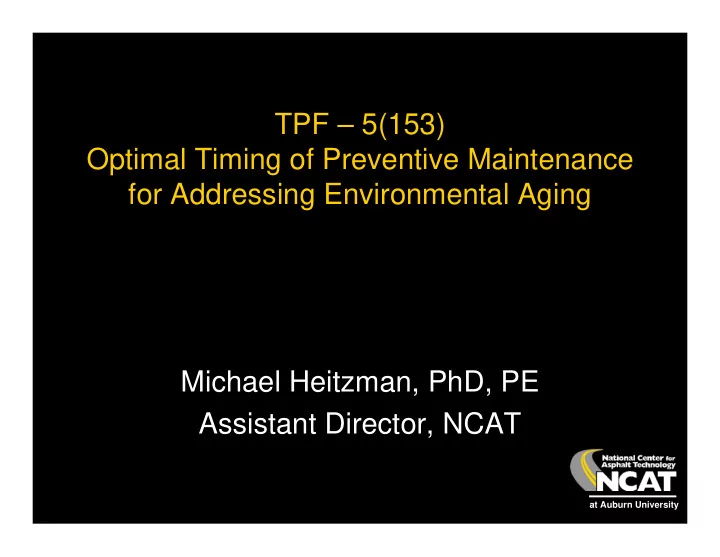

TPF – 5(153) Optimal Timing of Preventive Maintenance for Addressing Environmental Aging Michael Heitzman, PhD, PE Assistant Director, NCAT at Auburn University
TRAFFIC CLIMATE Weight Frequency Temperature – high/low Moisture MAINTENANCE ASPHALT Sealing Repair Rehabilitation BINDER RUTTING Stiffness/Flexibility Modification FATIGUE CONSTRUCTION STRIPPING Uniformity Density Smoothness AGING AGGREGATE THERMAL CRACK Gradation Quality Shape Texture Absorption FRICTION PAVEMENT RAVELING STRUCTURE MIXTURE Mixture Thickness SUBGRADE Air voids VMA – VFA Film thickness Stripping Material Moisture Strength Filler:binder ratio Compaction Strength
Summary of Recent Projects • Analysis method to better quantify film thickness • Analysis method to measure binder aging without large extracted samples • Better characterization of mineral filler at Auburn University
Film Thickness Development of new film thickness models for hot mix asphalt Michael Heitzman 2005 dissertation Iowa State University, Ames, Iowa New Approaches for Computing Film Thickness Michael Heitzman Iowa Department of Transportation 2006 AAPT additional paper, not presented at Auburn University
Film Thickness (VIRTUAL Model) a 1 t + a 2 t 2 + a 3 t 3 = ln(1-Vs / Va) Random Spatial Distribution
Air Void Impact Grad-C MF=6% Gsb=2.55 12.00 INDEX 11.00 Film Thickness (microns) STANDARD 10.00 VIRTUAL 9.00 8.00 7.00 6.00 0 2 4 6 8 10 12 Compacted voids
Research Beyond Film Thickness?? VIRTUAL MASTIC Standard INDEX Air Asphalt Binder Mineral Filler Fine Aggregate Coarse Aggregate
Measuring Binder Aging Reducing Stiffness of Oxidized Binder in Recycled Asphalt Mixture by Stage Mixing Kwang W. Kim, Jaehun Jung, and Young S. Doh Kangwon National University, Chuncheon, Korea Serji N. Amirkhanian Clemson University, Clemson, SC AAPT 2007 at Auburn University
Measuring Binder Aging The Test Method “Since the oxidation is a process that changes molecular size distribution of the binder, … it is possible to utilize gel-permeation chromatography (GPC) to detect this delicate change of molecular size distribution. Many studies have already shown that a relatively high correlation exists between viscosity and corresponding large molecular size (LMS) distribution in the GPC profile.” “In this GPC method, a small amount of mixture particle was dissolved into a solvent (tetrahydrofuran: THF) and a GPC sample was collected from the filtered dissolution.” AAPT paper
Measuring Binder Aging
Mineral Filler We know very little about the mineral filler • Physical properties (gradation, shape) • Chemical properties • Proportion in the mixture Mineral Filler Gradation 100.0 90.0 80.0 Percent passing 70.0 60.0 50.0 40.0 30.0 20.0 Data from AAPT Vol 52, 1983 10.0 0.0 0.001 0.005 0.01 0.02 0.05 0.075 Sieve size (mm)
Mineral Filler • NCHRP 09-45 Development of Specification Criteria for Mineral Fines Used in HMA – 3-year study started in 2007 – PI is Dr. Hussian Bahia, University of Wisconsin - Madison • Effect of Ultrafine Particles on Linear Viscoelastic Properties of Mastics and Asphalt Concretes – TRB 2008 paper 08-0865 – Delaporte et al, France at Auburn University
What is needed • Comprehensive study of the mechanisms that influence MIXTURE aging MIXTURE Aging = mixture performance change as the asphalt binder ages Mixture performance = rutting, fatigue, low temperature cracking at Auburn University
Nationally Combined Efforts • FHWA directed research (ex: WRI, NCAT) • NCHRP (2-3 year development period) • Pooled fund (committed DOTs) at Auburn University
Emphasis of this project • Can we optimize the preventive maintenance, if we do not understand what we are measuring? • Do we understand the aging process? Yes. • Do we know what factors influences aging? Yes. at Auburn University
Emphasis • Do we know what factors are most important? No. We need a better understanding of the critical factors, then determine how to best control them. • Do we know how the factors that influence aging impact other key performance criteria (rutting, fatigue, ...)? We cannot study aging without recognizing that HMA performance is complex. • What is the best way to measure aging? Binder or mixture response? We cannot ignore mixture response. If binder ages, but mixture performance does not change … then aging is at acceptable levels. at Auburn University
Closing comments • There is no single magic bullet. • Research must keep one eye focused on the practical application of the results. • Do not narrow the research to binder only. Include mixture and mastic. at Auburn University
Recommend
More recommend